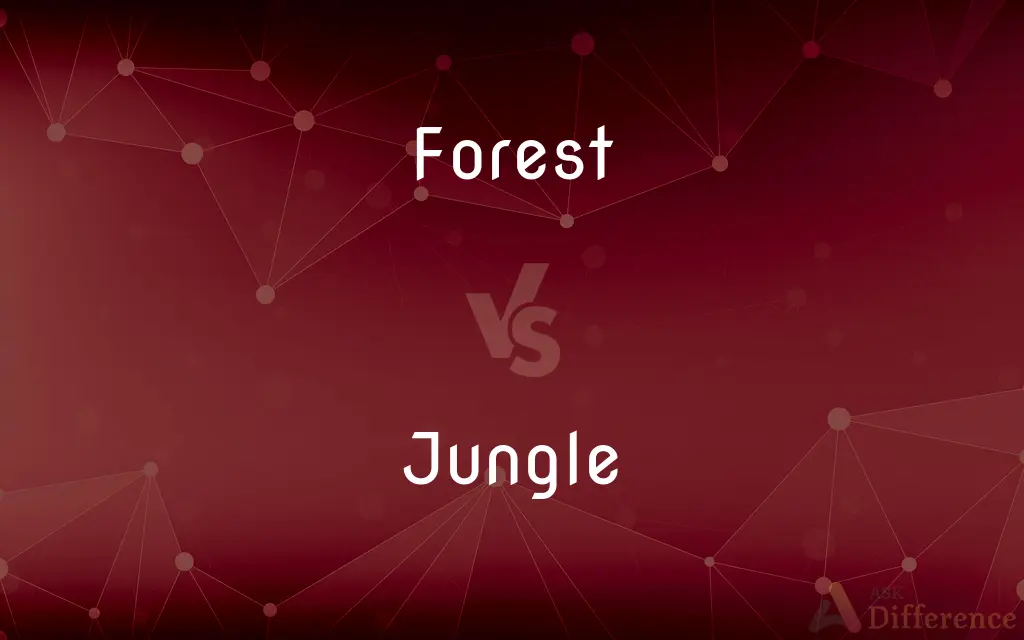Forest vs. Jungle — What's the Difference?
Edited by Tayyaba Rehman — By Fiza Rafique — Updated on October 29, 2023
Forest is a vast expanse of trees predominantly in temperate regions. Jungle is a dense, tropical vegetation with a hot, humid climate.

Difference Between Forest and Jungle
Table of Contents
ADVERTISEMENT
Key Differences
Forest typically refers to a vast expanse of trees, often found in temperate regions. Jungle, on the other hand, is a dense, thick vegetation that's characteristic of tropical rainforests, exhibiting a hot and humid climate.
In a forest, the trees are usually well-spaced with a clear understory, allowing for easy movement. In contrast, a jungle is marked by its thick undergrowth, making it challenging to traverse due to vines, shrubs, and dense foliage.
Forests can be diverse in their types; ranging from deciduous forests, where trees shed leaves in fall, to coniferous forests dominated by cone-bearing trees. Jungles are primarily found around the equator, teeming with diverse species due to the consistent rainfall and warmth throughout the year.
Another distinction lies in the fauna. Forests, especially in temperate zones, might be home to animals like deer, bears, and wolves. Jungles, being in tropical regions, host creatures such as jaguars, monkeys, and various reptiles.
While both forest and jungle are ecosystems crucial for our planet's health, they represent different environmental dynamics. Forests play a key role in temperate zones, acting as carbon sinks, whereas jungles, with their dense vegetation, are the Earth's lungs, converting vast amounts of carbon dioxide into oxygen.
ADVERTISEMENT
Comparison Chart
Climate
Predominantly temperate.
Tropical, hot, and humid.
Vegetation Density
Spaced-out trees with clear understory.
Dense undergrowth, thick foliage, and vines.
Location
Found globally, away from the equator.
Primarily around the equatorial region.
Typical Fauna
Deer, bears, wolves, etc.
Jaguars, monkeys, reptiles, etc.
Ecological Role
Acts as carbon sinks.
Converts vast CO2 amounts into oxygen.
Compare with Definitions
Forest
Trees harvested for timber or wood.
The wood for the furniture came from the forest.
Jungle
Symbolic of wild, chaotic environments.
The city felt like a concrete jungle with its bustling streets.
Forest
A large area covered with trees and underbrush.
The forest echoed with the sounds of chirping birds.
Jungle
Hot, wet habitats around the equator.
The jungle climate was humid and teeming with life.
Forest
A designated conservation area.
The national forest was protected from deforestation.
Jungle
Challenging to traverse due to its density.
They lost their way in the dense jungle.
Forest
Can be evergreen or deciduous based on tree type.
The deciduous forest was ablaze with autumn colors.
Jungle
A jungle is land covered with dense forest and tangled vegetation, usually in tropical climates. Application of the term has varied greatly during the past recent centuries.
Forest
A forest is an area of land dominated by trees. Hundreds of definitions of forest are used throughout the world, incorporating factors such as tree density, tree height, land use, legal standing and ecological function.
Jungle
Land covered with a dense growth of tropical vegetation.
Forest
A large area covered chiefly with trees and undergrowth
A pine forest
A large tract of forest
Jungle
A dense thicket or growth.
Forest
A large number or dense mass of vertical or tangled objects
A forest of high-rise apartments
Jungle
A dense, confused mass; a jumble.
Forest
Cover (land) with forest; plant with trees
A forested hillside
Jungle
Something made up of many confused elements; a bewildering complex or maze
Sorting through the jungle of regulations.
Forest
A growth of trees and other plants covering a large area.
Jungle
A place or milieu characterized by intense, often ruthless competition or struggle for survival
The corporate jungle.
Forest
A large number of objects bearing a similarity to such a growth, especially a dense collection of tall objects
A forest of skyscrapers.
Jungle
(Slang) A place where hoboes camp.
Forest
A defined area of land formerly set aside in England as a royal hunting ground.
Jungle
A large, undeveloped, humid forest, especially in a tropical region, that is home to many wild plants and animals; a tropical rainforest.
Forest
To plant trees on or cover with trees.
Jungle
(South Asia) Any uncultivated tract of forest or scrub habitat.
Forest
A dense uncultivated tract of trees and undergrowth, larger than woods.
Jungle
(colloquial) A place where people behave ruthlessly, unconstrained by law or morality.
It’s a jungle out there.
Forest
Any dense collection or amount.
A forest of criticism
Jungle
(figurative) A tangled mess.
Forest
(historical) A defined area of land set aside in England as royal hunting ground or for other privileged use; all such areas.
Jungle
(slang) An area where hobos camp together.
Forest
(graph theory) A graph with no cycles; i.e., a graph made up of trees.
Jungle
(UK) A migrant camp.
Forest
A group of domains that are managed as a unit.
Jungle
A style of electronic dance music and precursor of drum and bass.
Forest
The colour forest green.
Jungle
A desert region.
Forest
(transitive) To cover an area with trees.
Jungle
Dense rough.
Tiger country
Forest
An extensive wood; a large tract of land covered with trees; in the United States, a wood of native growth, or a tract of woodland which has never been cultivated.
Jungle
A hairy vulva.
Forest
A large extent or precinct of country, generally waste and woody, belonging to the sovereign, set apart for the keeping of game for his use, not inclosed, but distinguished by certain limits, and protected by certain laws, courts, and officers of its own.
Jungle
(Of musical beat, rhythm, etc.) resembling the fast-paced drumming of traditional peoples of the jungle.
Forest
Of or pertaining to a forest; sylvan.
Jungle
A dense growth of brushwood, grasses, reeds, vines, etc.; an almost impenetrable thicket of trees, canes, and reedy vegetation, as in India, Africa, Australia, and Brazil.
The jungles of India are of bamboos, canes, and other palms, very difficult to penetrate.
Forest
To cover with trees or wood.
Jungle
A place of danger or ruthless competition for survival.
Forest
The trees and other plants in a large densely wooded area
Jungle
Anything which causes confusion or difficulty due to intricacy; as, a jungle of environmental regulations.
Forest
Land that is covered with trees and shrubs
Jungle
An impenetrable equatorial forest
Forest
Establish a forest on previously unforested land;
Afforest the mountains
Jungle
A location marked by an intense competition and struggle for survival
Forest
Woodland with diverse ecosystems.
The forest was home to many different species of animals and plants.
Jungle
A place where hoboes camp
Jungle
Thick, tropical vegetation with dense undergrowth.
The explorer made his way through the jungle, cutting vines as he went.
Jungle
Home to diverse, often exotic, species.
Monkeys and parrots were common sights in the jungle.
Common Curiosities
Can forests be found near the equator?
Yes, tropical forests are found near the equator, but they differ from jungles due to tree spacing and canopy structure.
Which is denser, a Forest or a Jungle?
Jungles are denser due to their thick undergrowth and foliage.
Which has more biodiversity, Forest or Jungle?
While both have rich biodiversity, jungles, especially tropical rainforests, are often considered the most biodiverse places on Earth.
What's the main difference between a Forest and a Jungle?
Forests are vast expanses of trees often in temperate zones, while jungles are dense, tropical vegetations.
Are all jungles protected from deforestation?
No, unfortunately, many jungles face threats from logging, agriculture, and other activities.
Are jungles and rainforests the same?
While similar, jungles have denser undergrowth, while rainforests have a more distinct layered structure.
Are jungles always hot and humid?
Yes, jungles are typically characterized by a hot, humid climate.
Why is it hard to move through a Jungle?
Jungles have dense undergrowth, thick foliage, and vines, making them challenging to traverse.
Can you find bears in a Jungle?
Bears are typically associated with forests, not jungles.
Can a forest be found in a dry region?
Yes, there are dry forests, also known as seasonal forests, which are adapted to regions with dry seasons.
Which is larger, a Forest or a Jungle?
Forests cover more global land area than jungles. However, the size varies depending on the specific forest or jungle.
Do all forests have the same types of trees?
No, forests can be deciduous, coniferous, or mixed, among other types.
Can jungles exist outside of tropical regions?
While the term "jungle" is primarily associated with tropical regions, it's sometimes used colloquially for dense forests outside the tropics.
Are jungles always located in the tropics?
Jungles are primarily found in tropical regions around the equator.
Do forests play a role in climate regulation?
Yes, forests act as carbon sinks, absorbing and storing carbon dioxide.
Share Your Discovery

Previous Comparison
Automatic vs. Slushbox
Next Comparison
Hoarding vs. BannerAuthor Spotlight
Written by
Fiza RafiqueFiza Rafique is a skilled content writer at AskDifference.com, where she meticulously refines and enhances written pieces. Drawing from her vast editorial expertise, Fiza ensures clarity, accuracy, and precision in every article. Passionate about language, she continually seeks to elevate the quality of content for readers worldwide.
Edited by
Tayyaba RehmanTayyaba Rehman is a distinguished writer, currently serving as a primary contributor to askdifference.com. As a researcher in semantics and etymology, Tayyaba's passion for the complexity of languages and their distinctions has found a perfect home on the platform. Tayyaba delves into the intricacies of language, distinguishing between commonly confused words and phrases, thereby providing clarity for readers worldwide.
















































